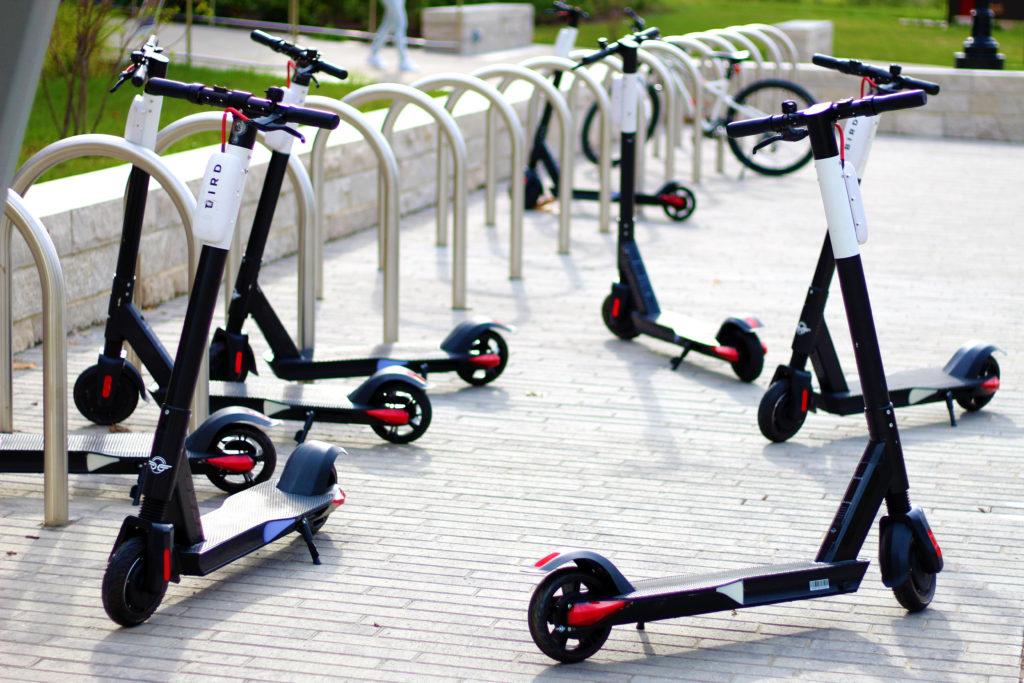As students slowly trickled back onto campus these past three weeks, there was another new campus addition as well: Bird scooters. The scooter and bike share company brought the new electric scooters to Grinnell on July 10 for a one-year trial period. But despite initial excitement about the scooters as a convenient new mode of transportation in Grinnell, issues with the scooters themselves have made the reality much less thrilling.
When a representative from Bird first contacted Tyler Avis, director of planning and building for the city of Grinnell, he thought it was junk mail. Eventually, they connected and after many conversations the city of Grinnell finally approved the usage of Bird scooters on public streets.
“The city doesn’t have a contract with Bird … Bird has been given permission to use the city’s right of way to store the scooters. The city is not receiving any funding or financial assistance,” said Avis.
During the city’s discussion with Bird, major safety concerns came up. “[In] Cedar Rapids and Iowa City, two adolescents were riding the scooter[s] and crashed and [were] struck by a vehicle, entirely due to scooter riders’ error,” Avis said.
According to a study conducted by the Insurance Institute for Highway Safety (IIHS) comparing electric scooters and bicycles in Washington D.C. in 2019, electric scooter riders are much less likely to wear helmets than bicyclists (two percent vs. 66.4 percent). Electric scooter riders are also more likely to have a concussion with a loss of consciousness.
Bird assured the city of Grinnell that their riders would all be at least 18 years old since the app requires a driver’s license, and there have yet to be any major accidents in Grinnell. For Grinnell, Bird’s biggest issue lies in the lack of scooter management and the hindrance caused by scooters scattered around both public and private property.
Avis himself has taken a number of calls complaining about scooters being left in yards. “I ended up just taking a phone call from an individual that the scooter had been in their yard for four days, and so I went and picked it up and actually brought it to my office,” he said. “And it was in my office for seven business days before any representative from Bird reached out to me.”
The placement of scooters sprawled carelessly along public pathways is also an accessibility issue. “[For] someone in a wheelchair or an individual that may be blind, they can’t easily maneuver something that’s blocking their pathway onto the sidewalk and crosswalk,” said Avis.
Grinnell, like any location with the scooters, is supposed to have a local Bird manager who takes the scooters off the streets and charges them between 12 a.m. and 5 a.m. daily. But Bird couldn’t find someone locally to manage the Grinnell scooter fleet, so it’s often left uncharged for many days. Avis believes that a manager from a major city comes in irregularly to charge the scooters, but he thinks it is not an efficient process.
The scooters around campus and town are almost always unusable. “I was excited at first but they don’t ever seem to work,” said Avery Hootstein `23. “It’s either that they have low battery or just says ‘Connection problem’.”
The Bird scooters have a great potential to be a new and exciting mode of transportation around Grinnell’s town and campus, where traditional public transportation is lacking, but when lying around uncharged they are simply useless. “In my opinion, if I could give Bird a grade in terms of their rollout and continued operation I would give them an F,” said Avis.
Next July, the city of Grinnell will decide whether to renew the trial period.



























































